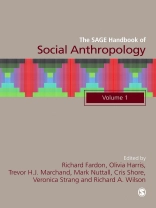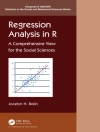In two volumes, the
SAGE Handbook of Social Anthropology provides the definitive overview of contemporary research in the discipline. It explains the what, where, and how of current and anticipated work in Social Anthropology. With 80 authors, contributing more than 60 chapters, this is the most comprehensive and up-to-date statement of research in Social Anthropology available and the essential point of departure for future projects.
The Handbook is divided into four sections:
-Part I: Interfaces examines Social Anthropology′s disciplinary connections, from Art and Literature to Politics and Economics, from Linguistics to Biomedicine, from History to Media Studies.
– Part II: Places examines place, region, culture, and history, from regional, area studies to a globalized world
-Part III: Methods examines issues of method; from archives to war zones, from development projects to art objects, and from ethics to comparison
-Part IV: Futures anticipates anthropologies to come: in the Brain Sciences; in post-Development; in the Body and Health; and in new Technologies and Materialities
Edited by the leading figures in social anthropology, the Handbook includes a substantive introduction by Richard Fardon, a think piece by Jean and John Comaroff, and a concluding last word on futures by Marilyn Strathern. The authors – each at the leading edge of the discipline – contribute in-depth chapters on both the foundational ideas and the latest research.
Comprehensive and detailed, this magisterial Handbook overviews the last 25 years of the social anthropological imagination. It will speak to scholars in Social Anthropology and its many related disciplines.
Innehållsförteckning
VOLUME ONE
Preface: The Association of Social Anthropologists of the UK and the Commonwealth – John Gledhill and James Fairhead
Foreword: Thinking Anthropologically, About British Social Anthropology – John L. Comaroff and Jean Comaroff
Introduction: Flying Theory, Grounded Method – Richard Fardon
PART ONE: INTERFACES – Edited by Cris Shore and Richard A. Wilson
Introduction: Anthropology′s Interdisciplinary Connections – Cris Shore and Richard A. Wilson
Anthropology and Linguistics – Alessandro Duranti
Anthropology and Psychology – Christina Toren
Anthropology of Biomedicine and Bioscience – Sarah Franklin
Anthropology and Art – Arnd Schneider
Anthropology, Media and Cultural Studies – Kevin Latham
Anthropology and Public Policy – Cris Shore
Anthropology and Law – Sally Engle Merry
Anthropology and History – Jane K. Cowan
Anthropology and Archaeology – Julian Thomas
Anthropology, Economics and Development Studies – Keith Hart
Anthropology and the Political – Jennifer Curtis and Jonathan Spencer
Anthropology and Religious Studies – Martin Mills
Anthropology and Museums – Brian Durrans
Anthropology and Gender Studies – Henrietta L. Moore
Anthropology and the Postcolonial – Richard Werbner
Anthropology and Literature – C.W. Watson
PART TWO: PLACES – Edited by Mark Nuttall
Introduction: Place, Region, Culture, History: From Area Studies to a Globalized World – Mark Nuttall
The Circumpolar North: Locating the Arctic and Sub-Arctic – Mark Nuttall
Replacing Europe – Sarah Green
Retroversion, Introversion, Extraversion: Three Aspects of African Anthropology – David Pratten
Refiguring the Anthropology of the Middle East and North Africa – Glenn Bowman
Southwest and Central Asia: Comparison, Integration or Beyond? – Magnus Marsden
South Asia: Intimacy and Identities, Politics and Poverty – Patricia Jeffery and Roger Jeffery
Modernization and its Aftermath: The Anthropology of Japan – D.P. Martinez
The Emerging Socio-Cultural Anthropology of Emerging China – J.S. Eades
Archipelagic Southeast Asia – Roy Ellen
Australasian Contrasts – Nicolas Peterson, Don Gardner and James Urry
Australia – Nicolas Peterson
Melanesia – Don Gardner
New Zealand/Aotearoa – James Urry
Two Indigenous Americas – Kathleen Lowrey and Pauline Turner Strong
North America – Pauline Turner Strong
South America – Kathleen Lowrey
North and Latin American National Societies from a Continental Perspective – John Gledhill and Peter Wade
Migration and Other Forms of Movement – Vered Amit
The Cosmopolitan World – Nigel Rapport
The Indigenous World – Robert K. Hitchcock and Maria Sapignoli
VOLUME TWO
PART THREE: METHODS – Edited by the late Olivia Harris and Veronica Strang
Introduction: Issues of Method – Richard Fardon and Veronica Strang
Fieldwork Since the 1980s: Total Immersion and its Discontents – Janet Carsten
Between Routine and Rupture: The Archive as Field Event – Tristan Platt
The Role of Language in Ethnographic Method – Susan Gal
The Ethnographic Interview in an Age of Globalization – Joshua Barker
Interpreting Texts and Performances – Karin Barber
Blurred Visions: Reflecting Visual Anthropology – Rupert Cox and Christopher Wright
Artefacts in Anthropology – Liana Chua and Amiria Salmond
Knowledge and Experimental Practice: A Dialogue Between Anthropology and Science and Technology Studies – Penelope Harvey
Twenty-first Century Ethics for Audited Anthropologists – Nayanika Mookherjee
Ethics Out of the Ordinary – Michael Lambek
Researching Zones of Conflict and War – Paul Richards
Conflicts and Compromises? Experiences of Doing Anthropology at the Interface of Public Policy – Tim Allen and Melissa Parker
From Participant-Observation to Participant-Collaboration: Some Observations on Participatory-cum-Collaborative Approaches – Paul Sillitoe
Comparative Methods in Socio-Cultural Anthropology Today – Andre Gingrich
PART FOUR: FUTURES – Edited by Trevor H.J. Marchand
Introduction: Anthropologies to Come – Trevor H.J. Marchand
Section 4.1: Neo-Darwinism, Biology and the Brain Sciences
Anthropology and Neo-Darwinism – Robin I.M. Dunbar
Cognition, Evolution and the Future of Social Anthropology – Harvey Whitehouse
Neuroanthropology – Greg Downey
Knowledge in Hand: Explorations of Brain, Hand and Tool – Trevor H.J. Marchand
Section 4.2: After Development: Environment, Food, Energy, Disaster
Environment and Society: Political Ecologies and Moral Futures – James Fairhead and Melissa Leach
Anthropological Encounters with Economic Development and Biodiversity Conservation – Laura M. Rival
New Directions in the Anthropology of Food – Jakob A. Klein, Johan Pottier and Harry G. West
Water, Land and Territory – Veronica Strang
The Anthropology of Disaster Aftermath – Edward Simpson
Section 4.3: Demographics, Health and the Transforming Body
Demographies in Flux – Sophie Day
New Medical Anthropology – Helen Lambert
The Anthropology of Drugs – Axel Klein
Transforming Bodies: The Embodiment of Sexual and Gender Difference – Andrea Cornwall
Section 4.4: New Technologies and Materialities
New Materials and New Technologies: Science, Design and the Challenge to Anthropology – Susanne K chler
Anthropology and Emerging Technologies: Science, Subject and Symbiosis – Ron Eglash
From Media Anthropology to the Anthropology of Mediation – Dominic Boyer
Anthropology in the New Millennium – Christopher Pinney
Afterword: A Last Word on Futures – Marilyn Strathern
Om författaren
Richard Ashby Wilson is the Gladstein Distinguished Chair of Human Rights and Professor of Law and Anthropology at UConn Law School, and founding director of the Human Rights Institute at University of Connecticut, US.












